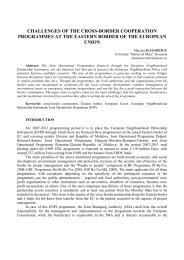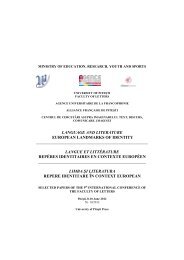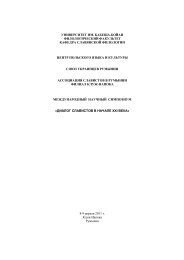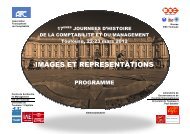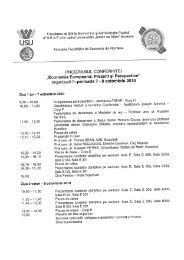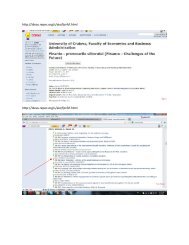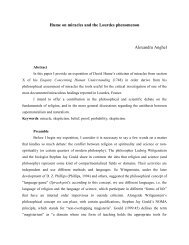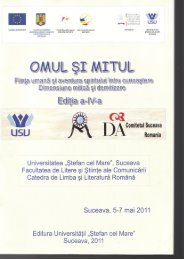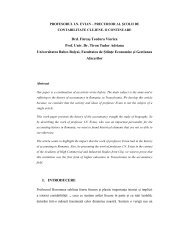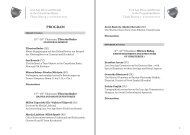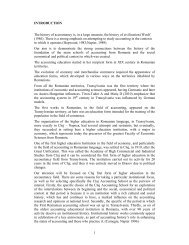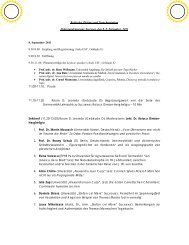- Page 1 and 2:
Atelier de Traduction Numéro 16 20
- Page 3 and 4:
Atelier de Traduction N° 16, 2011
- Page 5 and 6:
SOMMAIRE AVANT-PROPOS Irina Mavrodi
- Page 7 and 8:
Jean Poncet (France) - Poèmes de L
- Page 9:
AVANT-PROPOS 9
- Page 13:
I. ENTRETIEN 13
- Page 16 and 17:
Le professeur Michel Ballard a déj
- Page 18 and 19:
aurait donc tendance à le coincer
- Page 20 and 21:
comprendre le fonctionnement de la
- Page 22 and 23:
va déjà dans le sens de ce que vo
- Page 24 and 25:
M. C. - Vous avez coordonné un vol
- Page 27 and 28:
LA TRADUCTION INDÉFINIE. LA PRATIQ
- Page 29 and 30:
en excès. Traduire, c’est passer
- Page 31 and 32:
des langues et non de celui de la c
- Page 33 and 34:
Un malentendu : une lecture postcol
- Page 35:
évoquer la pure langue qui la fond
- Page 38 and 39:
le même texte original est fréque
- Page 40 and 41:
l’observation scrupuleusement chr
- Page 42 and 43:
contexte. La solution de Petru Dumi
- Page 44 and 45:
Gafton utilise le régionalisme chi
- Page 46 and 47:
1999, p. 105), vu que les maisons d
- Page 49 and 50:
Lilia BELTAÏEF 1 LA RETRADUCTION,
- Page 51 and 52:
II. La re-traduction ? Qu’est-ce
- Page 53 and 54:
Observons deux traductions du conte
- Page 55 and 56:
V. La retraduction : une question d
- Page 57 and 58:
traduction ? », il répond : « So
- Page 59:
traducteur. Ainsi conçue, la retra
- Page 62 and 63:
quelques éliminations des élémen
- Page 64 and 65:
Version roumaine no. 1 : Nerrantsul
- Page 66 and 67:
Le commentaire des trois versions s
- Page 68 and 69:
« Emballer » peut être traduit p
- Page 70 and 71:
et citron-on-ns !... (malheur de ma
- Page 72 and 73:
« îmbelşugat », d`origine hongr
- Page 74 and 75:
simtă stingherită, patru căi cur
- Page 76 and 77:
Istrati crée toute une légende, d
- Page 79 and 80:
L’IMPROMPTU DE MOLIÈRE EN ITALIE
- Page 81 and 82:
(Marchi, 1985, pp. 40-53) : L’Imp
- Page 83 and 84:
« souffle » de l’œuvre, et de
- Page 85 and 86:
1986, p. 106) 13 il doit être fonc
- Page 87 and 88:
Molière : (…) I re adorano una p
- Page 89 and 90:
“Il vaut mieux”, > “vale megl
- Page 91 and 92:
Molière : “Moi ? Je suis ton val
- Page 93 and 94:
matières de la nature de celles, s
- Page 95 and 96:
avons dérivé quelques proposition
- Page 97 and 98:
DU LÉZARD À LA LÉZARDE OU QUELQU
- Page 99 and 100:
entre autres, la retraduction inté
- Page 101 and 102:
Dans la vision bermanienne, la trad
- Page 103 and 104:
de la traduction révèle les origi
- Page 105 and 106:
Caen »), ou tout simplement d’un
- Page 107 and 108:
1955 de Pericle Martinescu s’appe
- Page 109 and 110:
Dans une phrase comme « Les murs m
- Page 111 and 112:
l’affadissent, même des contrese
- Page 113 and 114:
XVIII-lea şi al XIX-lea). Studii d
- Page 115 and 116:
Petronela MUNTEANU 1 TRADUCTION ET
- Page 117 and 118:
- une façon d’organiser le temps
- Page 119 and 120: manifeste sous divers aspects ; la
- Page 121 and 122: Dans le même ordre d’idées, Luc
- Page 123 and 124: National versus étranger Traduire
- Page 125 and 126: BERMAN, Antoine, (1999) : La traduc
- Page 127 and 128: TRADUCTION ET RETRADUCTION DE LA LI
- Page 129 and 130: Un point sur lequel les exégètes
- Page 131 and 132: ţinutului Québec ; pe jumătate l
- Page 133 and 134: cincilea era pe drum.In acea dimine
- Page 135 and 136: îmbrăcat într-un palton lung, ne
- Page 137 and 138: LA SÉRIE NOIRE, BESOIN OU VOLONTÉ
- Page 139 and 140: être artificiellement réactualis
- Page 141 and 142: Le titre original est A New Deal, d
- Page 143 and 144: cette réflexion : doit-on recherch
- Page 145 and 146: Unlike the various strands of struc
- Page 147 and 148: DU PARATEXTE VERS LE CONTEXTE : RET
- Page 149 and 150: fait qu’une bibliothèque nombreu
- Page 151 and 152: textes étrangers » 1 . Ce type de
- Page 153 and 154: différence entre la « version, pl
- Page 155 and 156: notions d’ordre (taxis), de propo
- Page 157 and 158: Précisons, pour conclure, que le f
- Page 159 and 160: VI. PRATICO-THÉORIES 159
- Page 161 and 162: LA RÉCEPTION ET LA TRADUCTION DE L
- Page 163 and 164: Une vague de traductions des romans
- Page 165 and 166: Barbu Ştefănescu Delavrancea qual
- Page 167 and 168: nouvelle constitue, selon notre con
- Page 169: Les Rougon-Macquart. On oublie (ou
- Page 173 and 174: seulement l’agent de la Renaissan
- Page 175 and 176: ont beaucoup contribué à la déma
- Page 177 and 178: produit un changement en ce qui con
- Page 179 and 180: IV.VINGT FOIS SUR LE MÉTIER 179
- Page 181 and 182: SINDROMUL DE PANICĂ ÎN ORAŞUL LU
- Page 183 and 184: SYNDROME DE PANIQUE DANS LA VILLE L
- Page 185 and 186: Revenons toutefois à mon pacte ave
- Page 187 and 188: POÈMES DE LUCIAN BLAGA TRADUITS PA
- Page 189 and 190: LÉGENDE Ève étincelante à la po
- Page 191 and 192: PSAUME Ô, toujours me fut douleur
- Page 193 and 194: À LA MÉMOIRE DU PEINTRE PAYSAN Au
- Page 195 and 196: PAYSAGE TRANSCENDANT Des coqs d’a
- Page 197 and 198: V. TERMINOLOGIE 197
- Page 199 and 200: L’ÉNONCIATION LITTÉRAIRE ET SON
- Page 201 and 202: sont suivis par des exercices d’a
- Page 203 and 204: Au-delà de la position centrale qu
- Page 205 and 206: Pour Maingueneau, une œuvre litté
- Page 207 and 208: prolongements de ce concept de la r
- Page 209 and 210: VI. PORTRAITS DES TRADUCTEURS 209
- Page 211 and 212: TRAIAN FINŢESCU - PORTRAIT D’UN
- Page 213 and 214: 4. Cinci săptămâni în balon [Ci
- Page 215 and 216: Il a eu aussi l’intention de cré
- Page 217 and 218: cauchemar pour le traducteur) et un
- Page 219 and 220: VII. PLANÈTE DES TRADUCTEURS 219
- Page 221 and 222:
L’AUTOTRADUCTION DANS TOUS SES ET
- Page 223 and 224:
autotraducteur Pere Gimferrer ou de
- Page 225 and 226:
ÉCOLE DE TRADUCTEURS ET D’INTERP
- Page 227 and 228:
JOURNÉES SCIENTIFIQUES INTERNATION
- Page 229 and 230:
Briana Belciug a proposé une analy
- Page 231 and 232:
ENSEIGNEMENT, RECHERCHE ET TRADUCTI
- Page 233 and 234:
LA TRADUCTION LITTÉRAIRE SOUS LA L
- Page 235 and 236:
marquage de l’alternance en situa
- Page 237 and 238:
VIII. COMPTES RENDUS 237
- Page 239 and 240:
TRANSLATIONES, N˚3/2011 Centre de
- Page 241 and 242:
à l’ouverture suggérée par la
- Page 243 and 244:
utile la lecture du présent volume
- Page 245 and 246:
MICHEL BALLARD, NUMELE PROPRII ÎN
- Page 247 and 248:
textuala (La grammaire des noms pro
- Page 249 and 250:
d’importance. C’est dans ce sen
- Page 251 and 252:
TRADUCTION ET FRANCOPHONIE. CONFÉR
- Page 253 and 254:
cette section appartient à Cristin
- Page 255 and 256:
MŰTA, JOURNAL DES TRADUCTEURS Volu
- Page 257 and 258:
De loin le volume le plus dense et
- Page 259 and 260:
parfaitement rigoureux au niveau sc
- Page 261 and 262:
mentaux du traducteur (intuitif / c
- Page 263 and 264:
PALIMPSESTES, NUMÉRO 23 / 2010, TR
- Page 265 and 266:
lesquelles l’auteur de l’articl
- Page 267 and 268:
L’article qui clôt ce numéro de
- Page 269 and 270:
RIELMA N° 3, 4/2011 Revue Internat
- Page 271 and 272:
concurrence oblige les traducteurs
- Page 273 and 274:
L’article de Dina Vîlcu traite d
- Page 275 and 276:
principes théoriques et idées d
- Page 277 and 278:
également un transfert légal, cas
- Page 279 and 280:
KATHARINA REISS : PROBLÉMATIQUES D
- Page 281 and 282:
2. La traduction littérale (gramma
- Page 283 and 284:
fondamentale consiste, pour le trad
- Page 285 and 286:
notion de genre de texte ; en parta
- Page 287 and 288:
LES AUTEURS MAVRODIN, Irina - auteu
- Page 289 and 290:
pratique et théorie, Les Contes de
- Page 291 and 292:
octobre, Titre de la communication
- Page 293 and 294:
Ţepelea, Horia Bădescu, Cezar Iv
- Page 295 and 296:
Après avoir préparé un travail d
- Page 297 and 298:
DOSSIERS THÉMATIQUES DES PROCHAINS
- Page 299 and 300:
CONSEILS AUX AUTEURS POUR LA PRÉSE



